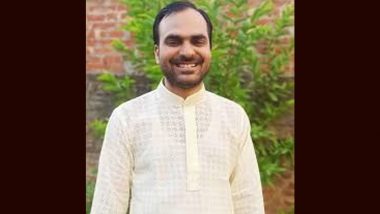Lucknow-based storyteller Himanshu Bajpai is set to present a compelling Dastan (story) on Wajid Ali Shah, the eleventh and final king of Awadh, which he says is aimed at challenging entrenched colonial narratives. The Dastango (storyteller) says that through "Dastan-E-Jaan-E-Aalam" his attempt is to highlight the cultural and historical significance of the monarch, whose story has been subject to differing interpretations over the years. Monkey Man Review: First Reactions Praise Dev Patel’s Direction and Storytelling After the Film’s SXSW Premiere!.
Bajpai, who has received accolades from Sahitya Akademi, former President Ram Nath Kovind and praise from Prime Minister Narendra Modi in ‘Mann ki Baat', described the story as a culmination of years of research and personal dedication.
Ahead of the August 24 public premiere of the Dastan here, Bajpai told PTI said that his fascination with Wajid Ali Shah began early in life, influenced by the rich storytelling traditions of Lucknow, where the stories about the king are widely shared.
"From childhood, I was immersed in stories about Wajid Ali Shah. It became evident that he was a remarkably interesting character, with narratives deeply embedded in the fabric of old Lucknow." He said that while the British established a “negative portrayal” of Wajid Ali Shah to justify the annexation of Awadh, the local sentiment in Lucknow tells a different story.
The colonial narrative, as Bajpai elaborated, portrayed Wajid Ali Shah as an ineffective and indulgent ruler, suggesting that his removal was necessary for the welfare of the people.
"The British aimed to discredit Wajid Ali Shah to legitimize their control over Awadh. They depicted him as a failure and his removal as a necessity," Bajpai said and criticised this portrayal as a distortion designed to serve colonial interests.
Bajpai said local perspective on Wajid Ali Shah is starkly different. "For the people of old Lucknow, Wajid Ali Shah is a cherished figure. His reign is remembered for nurturing the Ganga-Jamuni Tehzeeb, an amalgamation of cultural and religious traditions," he noted. He emphasised that the king's contributions to music, theatre, and the arts significantly shaped the cultural landscape of Lucknow. The storyteller described his mission as both a personal and cultural endeavour.
"As a Lucknowi, I felt a deep sense of protest against the colonial myths that have overshadowed the true legacy of Wajid Ali Shah," Bajpai said. He said the Dastan is intended to present the king's story as it is remembered by those who lived through his era, capturing the elements of love, beauty and social progress.
The research process for the Dastan was extensive, involving three to four years of meticulous work. Bajpai compiled primary sources, including books and oral histories from local experts and elders.
"Gathering material from various sources, including books in English, Hindi, Urdu, and Bangla, was a monumental task. The challenge was to piece together an authentic narrative from a wide range of perspectives," he explained. Bajpai also addressed the political significance of the Dastan, noting that it aligns with the broader theme of revisiting historical narratives in the context of the ‘Azadi ka Amrit Mahotsav'.
"This Dastan is not only a tribute to Wajid Ali Shah but also a political act aimed at correcting historical distortions. It represents an Indian narrative that stands in opposition to the colonial version," Bajpai asserted.
He said the free and open for all performance at the Sahu Theatre here on August 24 is set to be aimed at reinvigorating public memory about Wajid Ali Shah's contributions and correcting longstanding misconceptions. Bajpai added, "I hope this Dastan will bring to light the true essence of Wajid Ali Shah's legacy and celebrate the rich cultural heritage of Lucknow. It is a long-overdue correction to the myths that have persisted for over 150 years."
Bajpai will be joined by frequent collaborator Pragya Sharma in narrating 'Dastan-E-Jaan-E-Aalam'. The Storyteller: Paresh Rawal, Adil Hussain to Headline Satyajit Ray’s Adaptation.
"Sharma who has a PhD in economics quit her government job some yeas ago to pursue her passion for storytelling. We have performed serveral shows together within India and abroad," he said.













 Quickly
Quickly
















